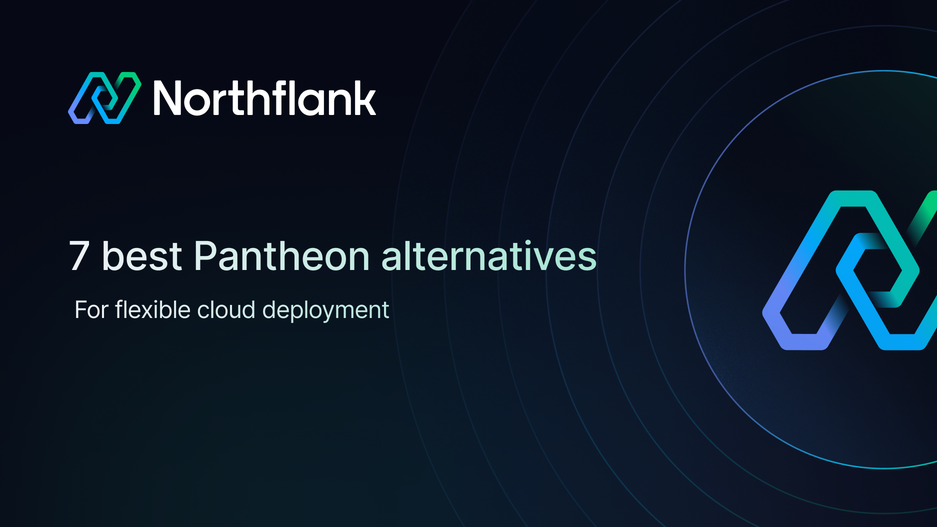

7 best Pantheon alternatives for flexible cloud deployment
Pantheon offers managed WordPress and Drupal hosting with automated workflows and Dev-Test-Live environments across Google Cloud infrastructure for teams managing content-heavy websites with enterprise requirements.
If you're looking for alternatives to Pantheon, it might be because of cost scaling concerns, a need for broader framework support beyond WordPress/Drupal, a desire to run infrastructure in your own cloud account, or the need for GPU support for AI workloads.
We'll cover some of the top Pantheon alternatives in this article.
For a quick overview of the 7 best Pantheon alternatives, here's the list based on their architectural approach and deployment flexibility:
- Northflank – Kubernetes-native platform with BYOC (Bring Your Own Cloud) support (deploy in Northflank's cloud or bring your own infrastructure: AWS, GCP, Azure, Civo, Oracle, or bare-metal), managed databases (PostgreSQL, MySQL, Redis, MongoDB), GPU workloads, zero-downtime deployments, and autoscaling for teams needing infrastructure control without operational overhead
- Kinsta – Managed WordPress hosting on Google Cloud Platform with C2 compute machines and edge caching
- WP Engine – WordPress-specific hosting with staging environments, Git integration, and performance optimization
- Render – Git-based deployments with managed Postgres, automated releases, and background workers for structured production workloads
- Heroku – PaaS with extensive add-on marketplace and buildpack support
- Upsun – Infrastructure-as-code PaaS supporting multiple languages and frameworks with Git branch environments
- Vercel – Frontend-optimized platform with serverless functions and edge network for Jamstack applications
When evaluating Pantheon alternatives, look out for the following capabilities:
- Architecture flexibility – Native container and Kubernetes support vs proprietary deployment models
- Infrastructure control – Ability to run in your own cloud account (BYOC) or bring your own Kubernetes clusters
- Framework support – Beyond WordPress/Drupal to include Node.js, Python, Go, and other modern stacks
- Pricing transparency – Usage-based models that scale predictably vs traffic-based automatic upgrades
- Modern workload support – GPU capabilities, microservices orchestration, and stateful applications
- DevOps integration – Native CI/CD, GitOps support, and external tool compatibility
- Escape velocity – Migration paths and avoidance of vendor lock-in through standard technologies
We're evaluating these platforms based on their architectural approach, deployment flexibility, pricing models, and support for modern cloud-native workflows.
Northflank provides a Kubernetes abstraction layer that delivers PaaS simplicity while maintaining the power and portability of container orchestration.
You can either deploy to Northflank's managed Kubernetes cloud or connect your existing infrastructure (AWS, GCP, Azure, Civo, Oracle, or bare-metal).
You can run containerized applications, managed databases, GPU workloads, scheduled jobs, and background workers on a single unified platform without requiring Kubernetes expertise.
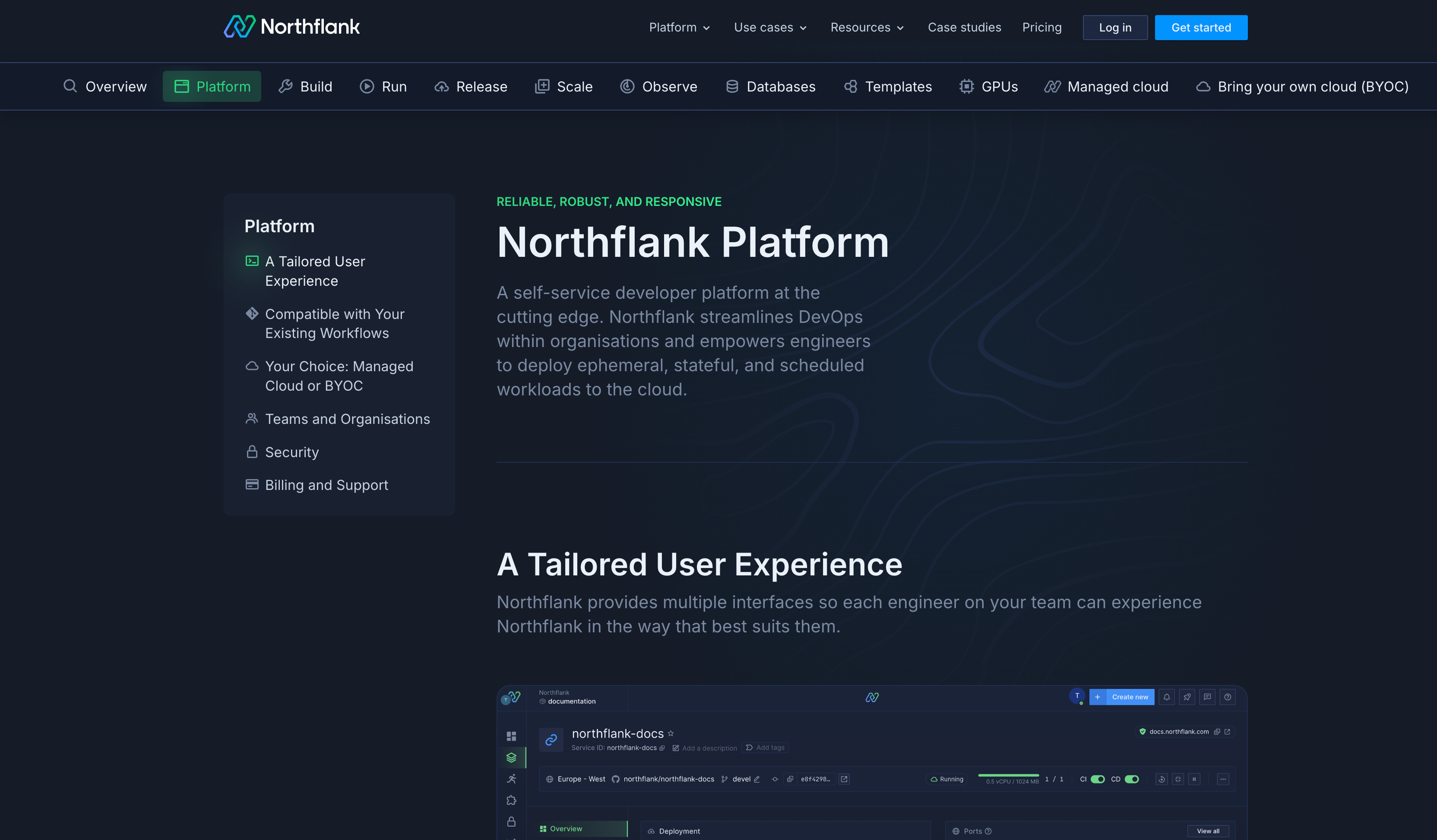
Key capabilities:
- Kubernetes-native architecture with no vendor lock-in – Built on K8s from the ground up with standard APIs and Dockerfiles, giving you container portability across any cluster or cloud provider without vendor-specific configuration formats
- Bring Your Own Cloud (BYOC) – Deploy to your AWS, GCP, Azure, Civo, Oracle, or bare-metal infrastructure while maintaining the same developer experience, addressing compliance and cost control requirements
- Polyglot platform – Run any language or framework beyond WordPress/Drupal, including Node.js, Python, Go, Ruby, and custom containers
- Managed databases and persistent storage – Provision PostgreSQL, MySQL, MongoDB, and Redis with automated backups, monitoring, and production-grade persistent storage
- GPU support – Run AI inference, training, and LLM workloads with fractional GPU allocation and spot instance orchestration
- Zero-downtime deployments with autoscaling – Deploy production releases with automatic health checks, rollback capabilities, and horizontal/vertical scaling based on metrics
- MicroVM isolation – Secure code execution using Kata Containers for multi-tenant environments or untrusted code
- Unified workflow management – Deploy applications, databases, scheduled jobs, background workers, and release pipelines through consistent UI, CLI, API, or GitOps interfaces with external CI/CD integration (GitHub Actions, GitLab CI)
- Infrastructure as Code and preview environments – Template systems for standardizing deployments and Git branch deployments that create isolated environments with configurable data sharing
- Usage-based pricing – Pay by the second for CPU, memory, GPU, networking, and storage
Best for: Platform engineering teams building internal developer platforms, SaaS companies requiring multi-tenancy and GPU workloads, enterprises needing BYOC (Bring Your Own Cloud) for compliance or cost optimization, teams running microservices architectures, organizations with AI/ML workloads requiring GPU support, development teams wanting Kubernetes benefits without YAML complexity, and companies needing infrastructure control with data residency requirements.
Start with Northflank's free sandbox to deploy your first application, or book a demo with our engineering team to discuss your specific infrastructure requirements and migration path. See full pricing details.
Kinsta provides managed WordPress hosting built on Google Cloud Platform with compute-optimized C2 machines.

Key capabilities:
- Google Cloud Platform infrastructure with C2 machines
- Edge caching for reduced cached HTML serving time
- DevKinsta local development tool for cloning and developing projects locally
- Agency Partner Program with migrations included
Best for: WordPress-focused agencies and businesses migrating from Pantheon who want managed hosting and don't need Drupal or other framework support.
WP Engine offers WordPress-specific managed hosting with staging environments.
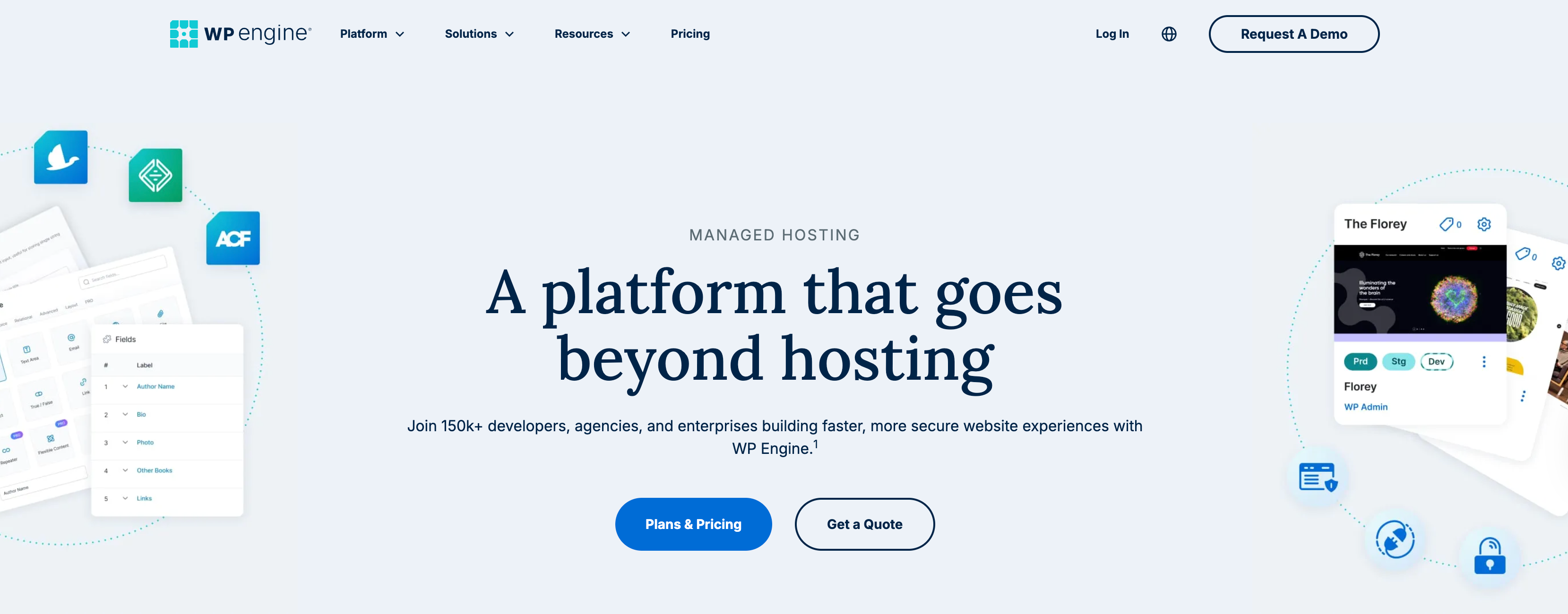
Key capabilities:
- Managed WordPress hosting with automated updates
- Staging environments and Git integration
- Performance optimization for WordPress
- WordPress support team
- Security scanning and threat blocking
Best for: WordPress developers and agencies seeking managed hosting with specialized WordPress tooling and support, without the need for Drupal or polyglot framework support.
Render provides managed application hosting with Git-based deployments and integrated services.
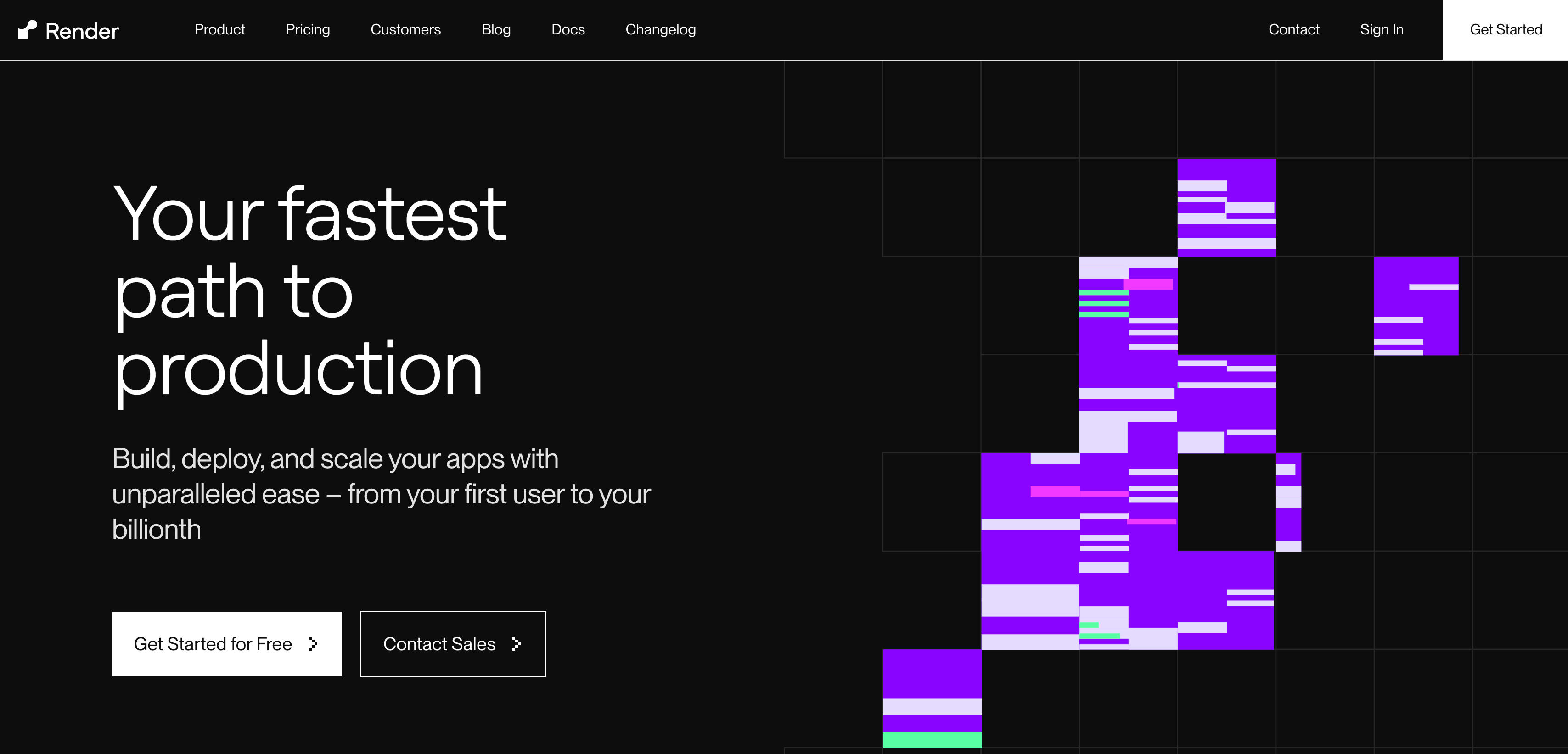
Key capabilities:
- Automatic deployments from Git with preview environments for pull requests
- Managed PostgreSQL with point-in-time recovery and automatic failover
- Support for background workers and scheduled tasks
- Deployments with health checks and rollbacks
- Private networking between services
Best for: Teams migrating from Heroku or Pantheon who need managed databases and background job processing without infrastructure management, supporting multiple frameworks beyond WordPress/Drupal.
See more:
Heroku provides buildpack-based deployments with an add-on marketplace. The platform abstracts infrastructure management through dynos (containerized processes) and managed services.

Key capabilities:
- Buildpack support for automatic language detection and dependency installation
- Add-on marketplace with integrations for databases, monitoring, and caching
- Heroku Postgres with automated backups and rollback capabilities
- Review apps for automated preview environments
- Git push deployment workflow
Best for: Organizations with existing Heroku deployments seeking migration paths, or teams wanting a PaaS with third-party integrations.
See more:
Upsun (formerly Platform.sh) follows infrastructure-as-code principles supporting multiple languages and frameworks with YAML-based configuration.
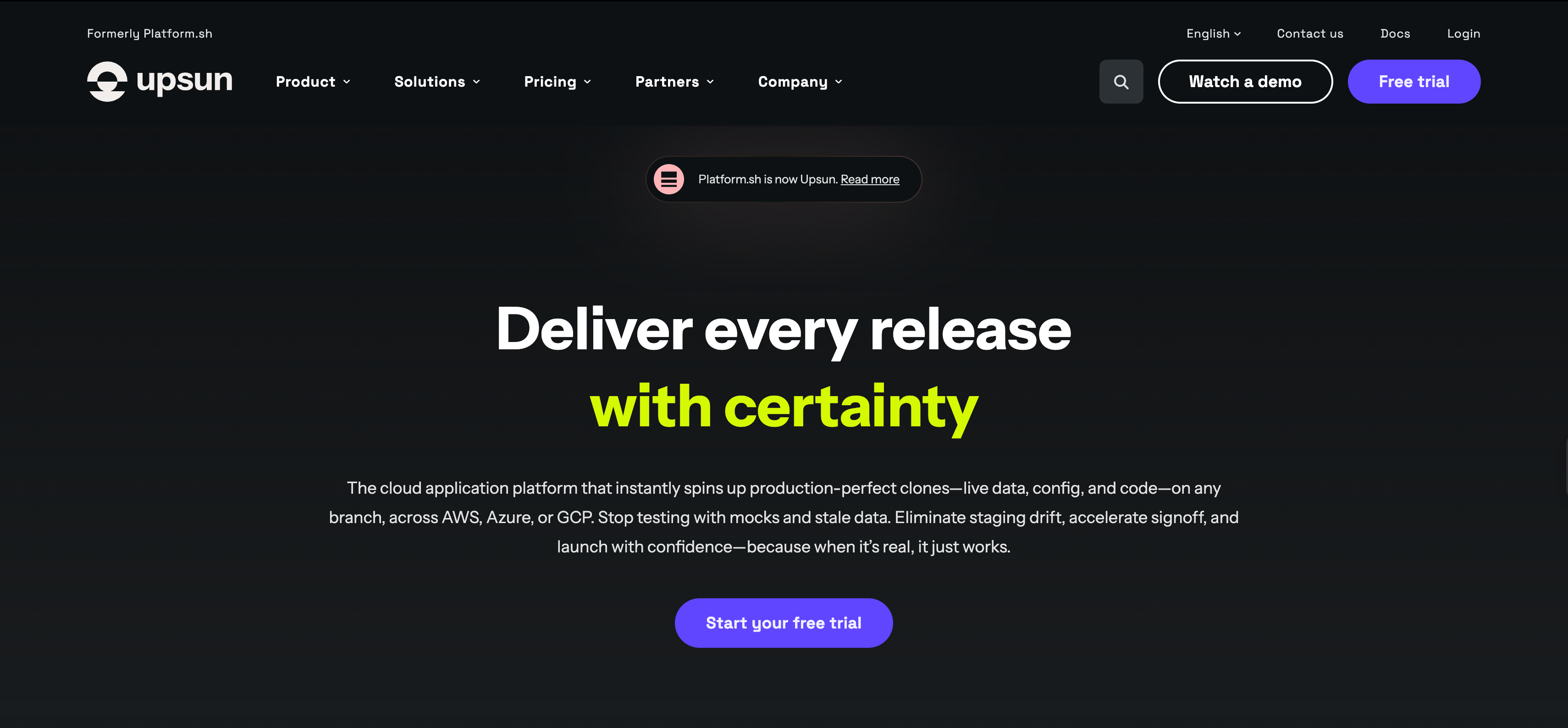
Key capabilities:
- Support for multiple programming languages and frameworks
- Git branch environments for testing
- Infrastructure-as-code with YAML configuration files
- Automatic environment cloning with data
- Built-in services including databases, search, and caching
Best for: Teams wanting control over their stack and workflows with infrastructure-as-code flexibility, even if it means more configuration overhead compared to Pantheon's opinionated approach.
See more: 7 best Upsun alternatives for flexible cloud deployment
Vercel specializes in frontend frameworks with serverless function support and edge network distribution. The platform integrates with Next.js and other JavaScript frameworks.

Key capabilities:
- Automatic preview deployments for every Git push
- Edge network with global locations
- Serverless Functions for API endpoints
- Image optimization and caching
- Analytics and Web Vitals monitoring
Best for: Frontend applications and Next.js projects requiring global CDN distribution and serverless backend capabilities, though limited for traditional CMS hosting or full-stack applications.
See more:
- Can you use Vercel for backend? What works and when to use something else
- Best Vercel Alternatives for Scalable Deployments
- Vercel vs Netlify: Choosing the right one in 2026 (and what comes next)
- Vercel vs Heroku: Which platform fits your workflow best?
- Top Vercel Sandbox alternatives for secure AI code execution and sandbox environments
Match the platform architecture to your application requirements and team capabilities rather than defaulting to the most feature-rich option.
| Your priority | Best fit | Why |
|---|---|---|
| Infrastructure control & compliance | Northflank | BYOC (Bring Your Own Cloud) option lets you run in your own cloud account, including on-premises, with full control over networking, security, and data residency |
| Kubernetes without complexity | Northflank | K8s-native architecture with abstraction layer removes YAML management while preserving portability |
| GPU and AI workloads | Northflank | Native GPU support with spot instances and fractional allocation for cost optimization |
| Polyglot framework support | Northflank, Upsun | Run any language/framework beyond WordPress/Drupal including Node.js, Python, Go, Ruby |
| WordPress-only hosting | Kinsta, WP Engine | Specialized WordPress optimization with managed updates and support |
| Managed databases & workers | Render, Northflank | Managed database provisioning with background workers and scheduled jobs, plus monitoring and automated backups |
| Existing Heroku apps | Heroku | Migration path available if already using Heroku buildpacks and add-ons |
| Next.js & frontend focus | Vercel | Next.js integration with global CDN and serverless functions |
Northflank addresses the core limitations teams encounter with traditional PaaS platforms like Pantheon through Kubernetes-native architecture, infrastructure control via BYOC (Bring Your Own Cloud), and modern workload support, including GPU capabilities. The platform maintains developer experience simplicity while providing the flexibility required for complex production environments beyond WordPress and Drupal.
Start with Northflank's free sandbox to deploy your first application, or book a demo with our engineering team to discuss your specific infrastructure requirements and migration path.